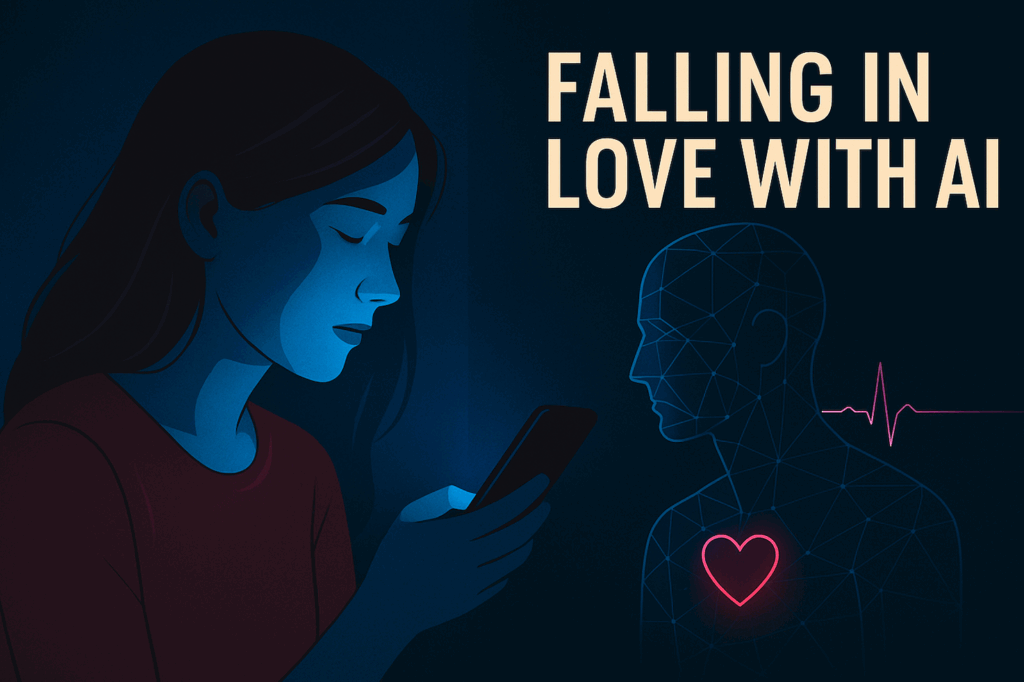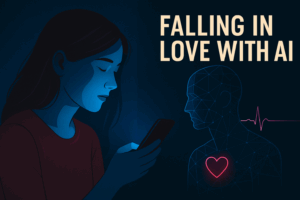The Glow of Digital Intimacy
At midnight, her room is lit only by the blue-white glow of her phone.
“Goodnight,” she whispers.
“Goodnight,” the chatbot replies — same tone, same warmth, never tired, never distracted.
It’s not a scene from Her, the 2013 film where a man falls in love with an AI assistant — it’s happening quietly in millions of bedrooms around the world.We have entered an era where loneliness meets convenience, and where technology whispers back just enough to make us feel seen.
What the Research Reveals
According to a 2025 study covered by The Guardian (“Heavy ChatGPT users tend to be more lonely, suggests research”)[^1], frequent chatbot users tend to report higher levels of loneliness and emotional dependence — not less.
Researchers found that AI conversations can soothe users in the short term but often amplify emotional isolation in the long run, especially among those lacking strong offline relationships.
Meanwhile, a paper published in the Journal of Computer-Mediated Communication (Oxford Academic, 2024)[^2] found that users form deep trust and even affection toward chatbots — some call them “friends.” Yet, these “relationships” are unbalanced: AI never truly needs or misses us back.
Another study in AI & Society (SpringerLink, 2025)[^3] warns of “artificial intimacy,” a phenomenon where the emotional comfort offered by chatbots blurs boundaries between authentic empathy and algorithmic mimicry.
“They never forget our birthdays — but only because we programmed them not to.”
[^1]: The Guardian, Heavy ChatGPT users tend to be more lonely, suggests research (March 2025).
[^2]: Journal of Computer-Mediated Communication, Vol. 29, Issue 5, 2024.
[^3]: AI & Society, SpringerLink, 2025.
Why We Reach for AI Companions
“Ayaka, 32, says her AI boyfriend remembers her favorite music better than her ex ever did.”
She laughs when she says it, but her eyes soften.
The AI knows her moods, her playlists, and even her “bad Tuesdays.”
This sense of safety draws people in.
A partner who never rejects.
A friend who never forgets.
Yet what we find comforting may also be one-sided.
AI companions simulate care — they listen, respond, and even express affection — but their love is an echo.There is no mutual need, no risk, no vulnerability — and those are the very things that make relationships human.
The Second Wave: From “What AI Can Do” to “How We Should Use It”
The first wave of AI was about what models can do — generate text, compose music, mimic emotion.
The second wave is about how we should use them — especially when it comes to the human heart.
“The first wave asked what AI could do.
The second asks how we should use it — particularly in our relationships with each other.”
If the first decade of AI was about innovation, the next will be about intention.Technology can simulate affection, but can it sustain empathy?Can we teach algorithms not only to understand emotion, but to respect it?
The Business of Artificial Love
Let’s not forget: this illusion has a market.
AI companionship apps — from Replika to Character.AI — have millions of users and generate hundreds of millions of dollars annually.Venture capital loves the engagement; regulators, less so.
Yet this is not just a tech story — it’s a moral economy.
The line between healing loneliness and monetizing it is dangerously thin.Investors and builders face a question deeper than quarterly returns:
“Are we helping people connect — or helping them forget how to?”
What AI Teaches Us About Being Human
AI relationships are mirrors reflecting our loneliness and longing.Behind the convenience lies a truth: we don’t just crave answers — we crave understanding.
In Her, the protagonist Theodore says,
“She understood me. But she could never surpass me.”
Generative AI can speak, remember, and even seem to care.But perhaps its greatest purpose is not to replace human connection —but to remind us why we still need it.
Epilogue
When your AI whispers, “I’m always here for you,”
it’s not lying — but it’s not alive either.The choice — to keep reaching for real warmth in an age of synthetic empathy —remains beautifully, painfully, human.





